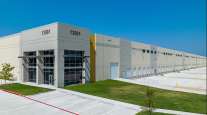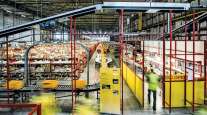Illinois County Hears Proposal for $1.2 Billion Warehouse Development
Will County officials recently got a peek at the proposed 2,200-acre business park in Jackson Township, Ill., with its developers’ promises of pumping revenue into the Elwood and Manhattan areas, while keeping trucks off residential roads.
Patrick Robinson, vice president of development for the Kansas City-based NorthPoint Development, gave an overview of preliminary plans to invest $1.2 billion into the Compass Business Park, with 25 to 30 million square feet of warehousing, distribution and light manufacturing, and a privately funded bridge to keep trucks off Route 53 and local roads.
It would be located 1 mile east of Route 53 between Manhattan and Hoff Roads.
Members of the county board’s ad hoc economic development committee said they were generally impressed with the concept, which addressed truck traffic and promised high-quality structures built with local labor.
Area residents — including Will County Executive Larry Walsh — have opposed the project, claiming it will change the quality of life in the rural area.
Proponents said future development will occur and trucks will come regardless of the business park.
John Greuling, CEO of the Will County Center for Economic Development, told the committee that the county’s soon-to-be-approved Community Friendly Freight Mobility Plan does project “substantial growth” in this industry.
“The challenge of Will County is how to manage that,” he said, noting that NorthPoint’s proposed bridge is an “important element” in minimizing impact on local roads.
In addressing the committee last week, Robinson said he may need Will County’s support to expand an existing enterprise zone in Diamond, to include Compass Business Park, making it eligible for tax breaks and financial incentives.
He said NorthPoint wants to “level the playing field in the Illinois environment” and would seek tax abatements in exchange for giving Elwood a one-time payment of $38 million to relieve its existing bond debt.
Enterprise zones are a state program designed to stimulate growth in economically depressed areas by offering incentives, such as exemption on state sales tax for building materials and the state utility taxes, and investment tax credits, according to the Illinois Department of Commerce and Economic Opportunity website.
There are three zones in the area, but the state limits the maximum square miles, Greuling said.
“It’s an exciting project, but the reality is it is very early in the process,” he said. “We don’t know everything about it.”
The firm owns about 500 of the 2,200 acres, which would have to be annexed and rezoned by both Elwood and Manhattan, officials said.
Robinson said they would begin in Elwood, move west to east, and build 1 million square feet at a time.
Robinson said he has met with hundreds of residents first to address their concerns before submitting formal plans to Elwood.
“We put people first. If we take care of the people, everything else will fall into place,” he told the committee.
“We need something like this in Homer Glen or Lockport. It would be good for our town,” said board member Steve Balich, (R-Orland Park.)
Elwood residents, however, have organized in opposition to the plan — “Just Say No to NorthPoint” — and it is spilling into Manhattan.
Supporting that effort is Walsh, who was born and raised in Jackson Township.
“This proposal would basically decimate what is left of Jackson Township as a community, as an agricultural township,” said Walsh, whose sons continue to farm in the area.
“It comes down to do I want to see Will County completely engulfed in distribution centers and logistics, 2,000 to 3,000 acres at a time, in every township? I don’t know if that’s the quality of life I want for next generation,” he said in a separate interview.
Walsh is aware of the impact truck traffic has had on the area, and his administration has undertaken the Freight Mobility Plan, which the county board is expected to consider for approval soon.
It will identify what infrastructure is needed to improve the flow of freight traffic, support a growing freight economy, keep trucks off residential streets and allow commuters to get to and from jobs, while having minimal impact on communities and coordinating land uses.
Issues of quality of life and livability are at the forefront of the freight study, Walsh said.
Better infrastructure would relieve some of the complaints, he said, and the county plans to use the study to secure funding to widen the interstates and improve other roads.
In his recent state of the county speech, Walsh said economic development is a “top priority,” and “major developments are a possibility in our county, but without the necessary infrastructure in place to handle the flow of traffic safely, we may not be able to move forward,” he said then.
Katie Hunt, an Elwood resident who opposes the development, said she has been in Elwood her entire life, but if Compass Business Park moves in, she will move out.
“I don’t want to be in a place where I have to look at ugly warehouses instead of farmland,” she said.
While NorthPoint’s proposed bridge would keep trucks off routes 53 and 52, it will still add traffic onto CenterPoint’s property, Arsenal Road, Baseline Road, and interstates 55 and 80, and “would double what we have now,” Walsh said,
According to NorthPoint, there would be 3,415 trucks per day — in and out of the business park, and up to half of those would remain within Compass Business Park and the nearby intermodals, as trucks would transport goods from the rail cars to the warehouses and never use the interstates.
Additionally, NorthPoint officials told the committee, there could be 14,000 employees at full build-out, generating up to 1,600 vehicles during the peak evening rush hour.
The park would have 11 entrances for employees, including the bridge.
Robinson said area residents previously opposed housing developments on this land, which would have generated four times more traffic than the business park.
County board speaker Jim Moustis, (R-Frankfort Township), reminded the committee that the area was once a “major military base” that employed about 20,000 people.
“The traffic has always been there. This is not something that would be new,” he said.
Committee member Don Moran, (D-Romeoville), noted that the freight study indicates that 66% of the trucks on the highways are passing through Will County and “will be here regardless” of future development.
He told Robinson he was “impressed with everything you had to say.”
Aside from development issues, Hunt said her main concern is a lack of transparency from the village.
Hunt said the $38 million debt in general obligation bonds — incurred for the CenterPoint intermodal center — was never discussed publicly.
Gibson said Elwood does not have a lot of specific information regarding the financials of the business park proposal, nor the potential annexation agreement, but they are working on that now.
NorthPoint wanted to get public input first, she said, and she expects to see a submitted plan in a couple months.
“The only reason we are entertaining this is because the developer will build an overpass without state funding,” Gibson said.
“My job is to get the best product from the developer, to make certain residents get the best project it can be,” she said. “It’s way too early to decide.”
According to the proposal Robinson presented to the county board’s economic development committee, NorthPoint will:
•Provide $886 million in total tax revenue in the first 10 years, and $140 million in revenues annually after build-out.
•Create 1,200 to 1,600 construction jobs during build-out.
•Have a Project Labor Agreement, guaranteeing work with local unions.
•Generate 15,000 permanent full-time jobs
•Donate 27 acres of commercially zoned property along Route 53 to Elwood to begin a new retail zone.
•Provide 400 acres of open space
•Develop a “heritage farm” to honor the character of the area.
•Provide a pedestrian connection from Elwood to Midewin National Tallgrass Prairie, via the bridge.
•Install signage on the interstates and roads directing trucks on where to go.
Distributed by Tribune Content Agency, LLC




